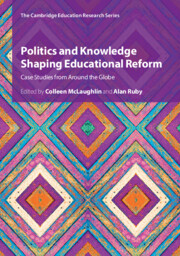Book contents
- Politics and Knowledge Shaping Educational Reform
- Politics and Knowledge Shaping Educational Reform
- Copyright page
- Contents
- Figures and Tables
- Contributors
- Preface
- 1 Introduction
- 2 Radical Curriculum Change and the Politics of ‘Implementation’
- 3 Towards a Play-Based Pedagogy in Ghanaian Kindergarten Education
- 4 Implementing Fee-Free Education in Rwanda
- 5 Policy Implementation in a Sisyphean State
- 6 Reforming the School System
- 7 Educational Reform in Scotland
- 8 The Role of Textbooks in Improving Education in Portugal
- 9 Turning Social Capital into a Working Wage
- 10 High-Performance and Equity
- 11 Missing Opportunity?
- 12 Conclusion
- Index
- References
4 - Implementing Fee-Free Education in Rwanda
Opportunities and Challenges
Published online by Cambridge University Press: 06 February 2025
- Politics and Knowledge Shaping Educational Reform
- Politics and Knowledge Shaping Educational Reform
- Copyright page
- Contents
- Figures and Tables
- Contributors
- Preface
- 1 Introduction
- 2 Radical Curriculum Change and the Politics of ‘Implementation’
- 3 Towards a Play-Based Pedagogy in Ghanaian Kindergarten Education
- 4 Implementing Fee-Free Education in Rwanda
- 5 Policy Implementation in a Sisyphean State
- 6 Reforming the School System
- 7 Educational Reform in Scotland
- 8 The Role of Textbooks in Improving Education in Portugal
- 9 Turning Social Capital into a Working Wage
- 10 High-Performance and Equity
- 11 Missing Opportunity?
- 12 Conclusion
- Index
- References
Summary
Thanks in part to a fee-free basic education policy, school enrolment in Rwanda has surged. More children, particularly those from poor families, now have access to more years within the public education system. At the same time, completion rates remain low and repetition rates remain high. This chapter looks at the ‘hidden costs’ of fee-free schooling in Rwanda. It pairs policy analysis with qualitative data gathering with children, families, teachers, and local and national decision-makers to consider why completion and transition rates aren’t as high as expected in the context of fee-free school. Findings suggest children continue to contend with a range of school-related costs that impact attendance, performance and completion. Examination fees, afterschool coaching, school feeding and ‘voluntary’ parent–teacher association dues shape children’s full participation in school. These ‘hidden costs’ are a key factor for why children do not complete their schooling. The notion of ‘culture’ or ‘backwards mindset’ as the primary reasons why families may choose not to send their children to school is challenged; instead there may be direct and indirect costs that are not accounted for, even in the context of a policy that appears to align with the Education for All agenda.
- Type
- Chapter
- Information
- Politics and Knowledge Shaping Educational ReformCase Studies from Around the Globe, pp. 43 - 57Publisher: Cambridge University PressPrint publication year: 2025

